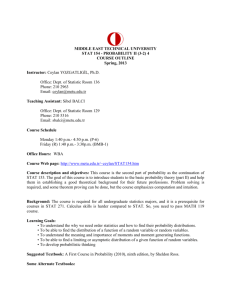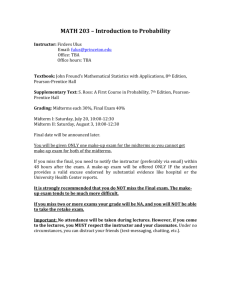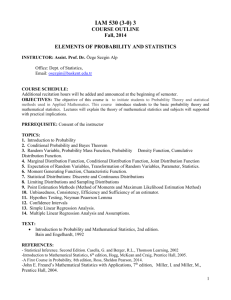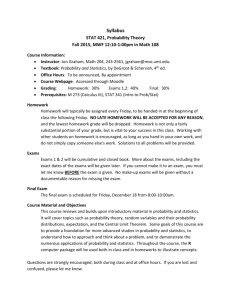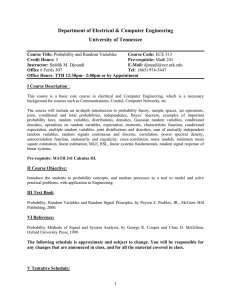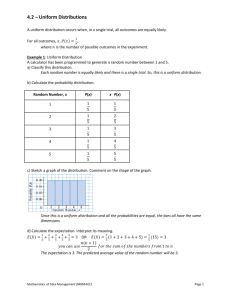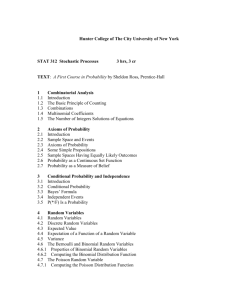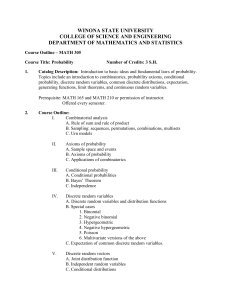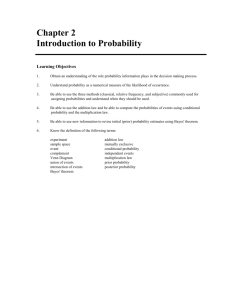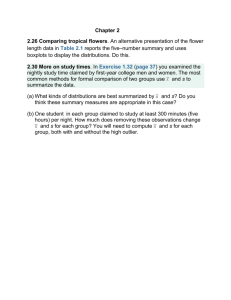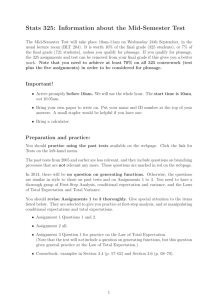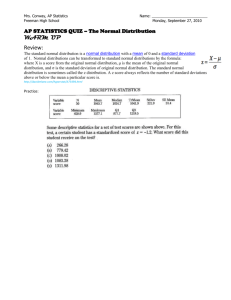Fall, 2014
advertisement
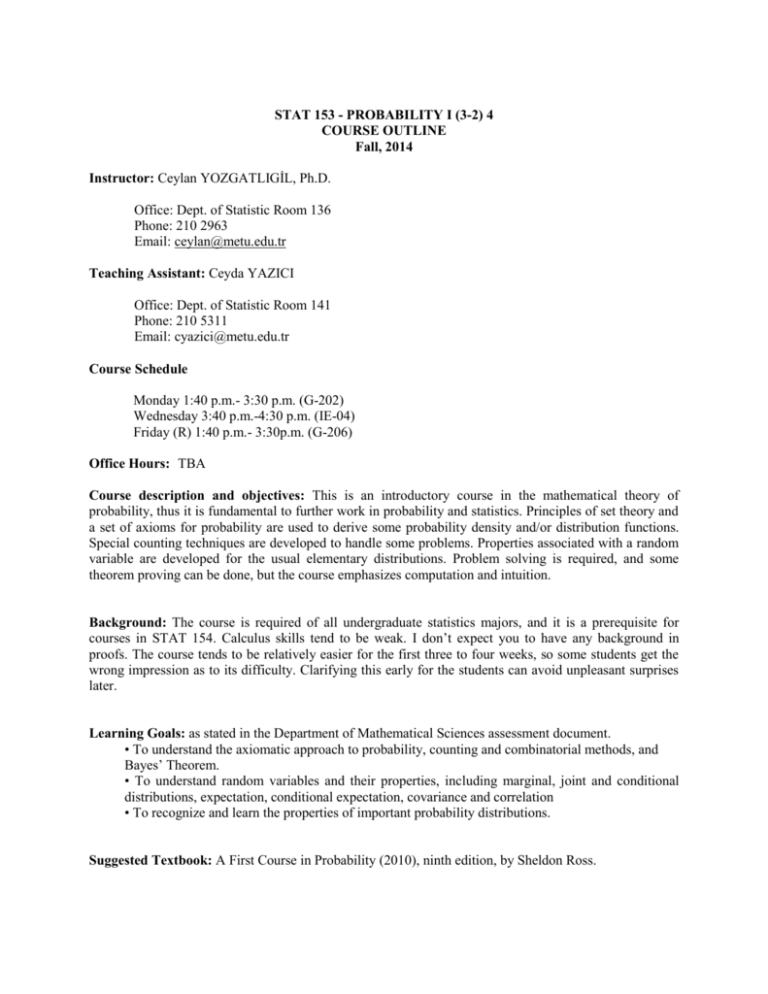
STAT 153 - PROBABILITY I (3-2) 4 COURSE OUTLINE Fall, 2014 Instructor: Ceylan YOZGATLIGİL, Ph.D. Office: Dept. of Statistic Room 136 Phone: 210 2963 Email: ceylan@metu.edu.tr Teaching Assistant: Ceyda YAZICI Office: Dept. of Statistic Room 141 Phone: 210 5311 Email: cyazici@metu.edu.tr Course Schedule Monday 1:40 p.m.- 3:30 p.m. (G-202) Wednesday 3:40 p.m.-4:30 p.m. (IE-04) Friday (R) 1:40 p.m.- 3:30p.m. (G-206) Office Hours: TBA Course description and objectives: This is an introductory course in the mathematical theory of probability, thus it is fundamental to further work in probability and statistics. Principles of set theory and a set of axioms for probability are used to derive some probability density and/or distribution functions. Special counting techniques are developed to handle some problems. Properties associated with a random variable are developed for the usual elementary distributions. Problem solving is required, and some theorem proving can be done, but the course emphasizes computation and intuition. Background: The course is required of all undergraduate statistics majors, and it is a prerequisite for courses in STAT 154. Calculus skills tend to be weak. I don’t expect you to have any background in proofs. The course tends to be relatively easier for the first three to four weeks, so some students get the wrong impression as to its difficulty. Clarifying this early for the students can avoid unpleasant surprises later. Learning Goals: as stated in the Department of Mathematical Sciences assessment document. • To understand the axiomatic approach to probability, counting and combinatorial methods, and Bayes’ Theorem. • To understand random variables and their properties, including marginal, joint and conditional distributions, expectation, conditional expectation, covariance and correlation • To recognize and learn the properties of important probability distributions. Suggested Textbook: A First Course in Probability (2010), ninth edition, by Sheldon Ross. Some Alternate Textbooks: A Course in Probability (2006), Neil A. Weiss. Understanding Probability (2012), Henk Tijm. Introduction to Probability and Mathematical Statistics (1992), Lee J. Bain and Max Engelhardt. http://wiki.stat.ucla.edu/socr/index.php/EBook Many introductory probability books from the library will be helpful. Course Content: Emphasize problem solving and intuition. Some advanced concepts should be presented without proof, so as to devote more attention to the examples. Introduction and basic definitions Basic combinatorics: Counting principle, permutations, combinations. Basic concepts: Sample spaces, events, basic axioms and theorems of probability, finite sample spaces with equally likely probabilities. Conditional probability: Reduced sample space, independence, Bayes' Theorem. Random variables: Discrete and continuous random variables, discrete probability functions and continuous probability density functions, distribution functions, expectation, variance, correlation coefficient, functions of random variables. Special distributions: Bernoulli, Binomial, Poisson, and Geometric discrete random variables. Uniform, Normal, and Exponential continuous random variables. Approximation of Binomial by Poisson or Normal. Jointly distributed random variables: Joint distribution functions, independence, conditional distributions, expectation, covariance Sums of independent random variables: expectation, variance. Attendance: Mandatory, though I will not take roll. You are responsible for everything we do in class, even on days you do not attend. Grading: Midterm exam 1 (25%) (Probably November 7th – Friday at 5:40 p.m.) Midterm exam 2 (25%) (Probably December 5th – Friday at 5:40 p.m.) Homework & Quiz (10%) Project (5%) Final (35%) Project: You will be designing your own game in groups of at least 2 and most 5. The game should be the type of game that you would play at home as borad game, carnival, amusement park or casino. It cannot be a game that already exists— your group must cre too complicated! Final Products: 1. Game – Include all game boards, playing pieces, cards, balls, etc. for your game. 2. Instructions - You must create a set of written or typed instructions to clearly explain your game. They must be easy to follow so that anyone can pick them up, read them and begin playing your game. 3. Write-Up – I will provide more information during the semester. Grading: I will provide a rubric during the semester. (If I can arrange the classroom, you will present your to me and your classmates). Make-Up Work:Make-up exams will only be given in very unusual circumstances, with one week prior notification (or, in the event of an emergency, *very* strong documentation of that emergency). If you have this kind situation and don’t contact with me one week before or after the exam, you cannot take the make-up exam. Make-up exam will be given at the end of the semester and it will be similar to the final exam (cover all the topics). Late Homework: Homework is collected in the recitation hours. Your homework will not be graded, if you bring it after the recitation hour. Academic Integrity: All assignments, quizzes, and exams must be done on your own. Note that academic dishonesty includes not only cheating, fabrication, and plagiarism, but also includes helping other students commit acts of academic dishonesty by allowing them to obtain copies of your work. You are allowed to use the Web for reference purposes, but you may not copy code from any website or any other source. In short, all submitted work must be your own. Should a student be caught cheating during an examination or be involved in plagiarism, a zero (0) will be assigned for the exam, quiz or writing assignment. Please look at the following page for further information: http://www.ueam.metu.edu.tr/TURKCE/ueam/ueam_ilkeler/ueam_ilkeler_honor_code_tab.htm Important Dates: Week of the ADD-DROP for the classes: September 29 – October 3, 2014 Religious Holiday-Eid al-Adha: October 4 – 7, 2014 National Holiday (National Day / Cumhuriyet Bayramı) (October 28, Tuesday afternoon, before the National Day): October 29, 2014 Last date for the WITHDRAWAL: November 28, 2014 End of lectures: December 31st, 2014 New Year’s Holiday : January 1, 2015 Final exams: January 5 – 17, 2015 Announcement of final grades: January 24, 2015 Resit Examinations: January 28 – 30, 2015
